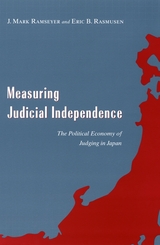
In this book, J. Mark Ramseyer, a noted authority on Japan looks at discrimination against groups in Japanese society, focusing on the Korean, Okinawan, and Burakumin groups. Ramseyer asks why they experience discrimination in Japan, an unusually homogeneous society. Is it because of some prejudice on the part of the majority that prevents their integration into mainstream Japanese society? Or is it because some of the dynamics within the group create incentives for the group to stay together and to be on the fringes of society?
Ramseyer argues that the real explanation is the latter, and each of these three groups has been victimized by its own leadership. Precisely because the groups are dysfunctional, members of the group cannot control members who would appoint themselves group leaders. The result has been the capture of leadership positions by people who manipulate the group to their own private advantage and to the detriment of the group as a whole.

In their insightful analysis, the authors show that the very idea of the keiretsu was created and propagated by Marxist scholars in post-war Japan. Western scholars merely repatriated the legend to show the culturally contingent nature of modern economic analysis. Laying waste to the notion of keiretsu, the authors debunk several related “facts” as well: that Japanese firms maintain special arrangements with a “main bank,” that firms are systematically poorly managed, and that the Japanese government guided post-war growth. In demolishing these long-held assumptions, they offer one of the few reliable chronicles of the realities of Japanese business.

"A compelling economic analysis. . . . This book remains one of the few concerning Japanese law that successfully brings to life the legal culture of Japan." —Bonnie L. Dixon, New York Law Journal



Co-published by the John M. Olin Center for Law, Economics, and Business at Harvard Law School and Harvard University Press, the JLA is a faculty-refereed, peer-reviewed publication on law. It aspires to be broad in coverage, including doctrinal legal analysis and interdisciplinary scholarship. JLA articles are free online and available for sale in bound issues.
Volume 1, Issue 1 contains contributions from Adrian Vermeule (Many-Minds Arguments in Legal Theory), Stephen J. Choi, G. Mitu Gulati, and Eric A. Posner (Are Judges Overpaid? A Skeptical Response to the Judicial Salary Debate), James Q. Whitman (Equality in Criminal Law: The Two Divergent Western Roads), Jonathan R. Macey and Geoffrey P. Miller (Judicial Review of Class Action Settlements), Melvin A. Eisenberg (Impossibility, Impracticability, and Frustration), Edward L. Glaeser, Cass R. Sunstein (Extremism and Social Learning), R. H. Helmholz (Bonham's Case, Judicial Review, and the Law of Nature), and David A. Hyman, Bernard Black, Charles Silver, and William M. Sage (Estimating the Effect of Damages Caps in Medical Malpractice Cases).
http://jla.hup.harvard.edu

Co-published by the John M. Olin Center for Law, Economics, and Business at Harvard Law School and Harvard University Press, the JLA is a faculty-refereed, peer-reviewed publication on law. It aspires to be broad in coverage, including doctrinal legal analysis and interdisciplinary scholarship. JLA articles are free online and available for sale in bound issues.
Volume 1, Issue 2 contains contributions from Tonja Jacobi (Competing Models of Judicial Coalition Formation and Case Outcome Determination), Thomas W. Merrill (Accession and Original Ownership), Kenneth M. Ayotte and Edward R. Morrison,(Creditor Control and Conflict in Chapter 11), Jonathan Baron and Ilana Ritov (The Role of Probability of Detection in Judgments of Punishment), John C. Coates (Reforming the Taxation and Regulation of Mutual Funds: A Comparative Legal and Economic Analysis), Adriaan Lanni (Social Norms in the Courts of Ancient Athens), Oren Bar-Gill and Omri Ben-Shahar (The Prisoners' (Plea Bargain) Dilemma), and William M. Landes and Richard A. Posner (Rational Judicial Behavior: A Statistical Study).
http://jla.hup.harvard.edu

Co-published by the John M. Olin Center for Law, Economics, and Business at Harvard Law School and Harvard University Press, the JLA is a peer-reviewed publication on law. It aspires to be broad in coverage, including doctrinal legal analysis and interdisciplinary scholarship. JLA articles are free online and available for sale in bound issues.
Volume 2, Issue 1 contains contributions from Einer R. Elhauge, Daniel E. Ho, Kevin M. Quinn, Gabriella Blum, Andrew T. Guzman, Timothy L. Meyer, Alon Harel, Tsvi Kahana, Anup Malani, Ward Fransworth, Dustin Guzior, Steven Shavell, Victor P. Goldberg, and Melvin A. Eisenberg.
http://jla.hup.harvard.edu

Co-published by the John M. Olin Center for Law, Economics, and Business at Harvard Law School and Harvard University Press, the JLA is a peer-reviewed publication on law. It aspires to be broad in coverage, including doctrinal legal analysis and interdisciplinary scholarship. JLA articles are free online and available for sale in bound issues.
Volume 2, Issue 2 contains contributions from Yair Listokin, Eric Posner, Kathryn Spier, Adrian Vermeule, Alan Sykes, Benito Arruñada, Theodore Eisenberg, Michael Heise, Ncole Waters & Martin Wells, J. Mark Ramseyer, and Jonathan Masur.
http://jla.hup.harvard.edu

Planned and designed by a leading Tokyo lawyer and several American practitioners and scholars, Law and Investment in Japan introduces both Japanese law and the strategic issues that arise in cross-border transactions. Centered around the details of an actual joint venture between the U.S. and Japan, the book combines materials from the transaction itself with cases, statutes, and background data.
This new second edition reflects recent changes in the law and new directions in scholarly research.

The Japanese Constitution, like many others, requires that all judges be "independent in the exercise of their conscience and bound only by this Constitution and its laws." Consistent with this requirement, Japanese courts have long enjoyed a reputation for vigilant independence—an idea challenged only occasionally, and most often anecdotally. But in this book, J. Mark Ramseyer and Eric B. Rasmusen use the latest statistical techniques to examine whether that reputation always holds up to scrutiny—whether, and to what extent, the careers of lower court judges can be manipulated to political advantage.
On the basis of careful econometric analysis of career data for hundreds of judges, Ramseyer and Rasmusen find that Japanese politics do influence judicial careers, discreetly and indirectly: judges who decide politically charged cases in ways favored by the ruling party enjoy better careers after their decisions than might otherwise be expected, while dissenting judges are more likely to find their careers hampered by assignments to less desirable positions.
Ramseyer and Rasmusen's sophisticated yet accessible analysis has much to offer anyone interested in either judicial independence or the application of econometric techniques in the social sciences.

With Second-Best Justice, J. Mark Ramseyer offers a more compelling, better-grounded explanation: the low rate of lawsuits in Japan results not from distrust of a dysfunctional system but from trust in a system that works—that sorts and resolves disputes in such an overwhelmingly predictable pattern that opposing parties rarely find it worthwhile to push their dispute to trial. Using evidence from tort claims across many domains, Ramseyer reveals a court system designed not to find perfect justice, but to “make do”—to adopt strategies that are mostly right and that thereby resolve disputes quickly and economically.
An eye-opening study of comparative law, Second-Best Justice will force a wholesale rethinking of the differences among alternative legal systems and their broader consequences for social welfare.
READERS
Browse our collection.
PUBLISHERS
See BiblioVault's publisher services.
STUDENT SERVICES
Files for college accessibility offices.
UChicago Accessibility Resources
home | accessibility | search | about | contact us
BiblioVault ® 2001 - 2024
The University of Chicago Press









